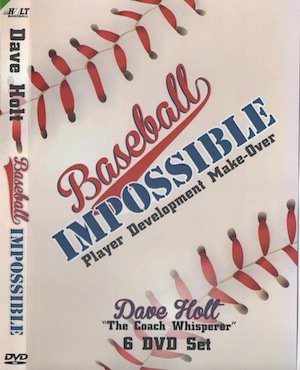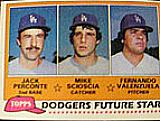Hey Friends ... sign up for my newsletter and get my
FREE Practice Checklist
Coach and Play Baseball Interview:
Jack Perconte Youth Coaching Expert
We are honored to have been able to spend some time recently with former major league player and youth baseball coaching expert, Jack Perconte.
Jack spent parts of seven years in the major leagues. Since retiring he has stayed close to the game working in youth baseball and writing about baseball. Here is my conversation with Jack which every youth league coach and parent should enjoy and take to heart.
1.Hi Jack. Thank you so much for joining us today. Please tell us a little bit about your self, your website at http://www.baseballcoachingtips.net/your books, videos and anything else you would like to mention.
Jack: I always thought I was the most uncreative person in the world until a few years ago when I realized I could write a little and that I had a perspective that was a little different from what was out in the market.
As a former major league player, parent, and long-time baseball instructor, I felt I could help others in the baseball and youth sports arena to handle challenging youth sport situations. I write to help parents and coaches to better understand how to work with kids and with teaching the game of baseball. I began writing, including two books so far – The Making of a Hitter: A Proven & Practical Step-by-Step Baseball Guide and and Raising an Athlete: How to Instill Confidence, Build Skills and Inspire a Love of Sport - and have not stopped writing since.
My website is a continuation of teaching the game of baseball and “how to coach the game,” based on my experiences, especially through coaching youth in more creative ways than have been done in the past.
Many of the questions you have asked here are about subjects I cover in my website and why I wrote the books. Many parents and coaches want to help, but do not have the expertise or knowledge to do it, so I hope to help some of those adults by sharing my experiences.
2. Jack, you talk about how coaches often incorrectly over-coach by yelling out too many instructions during the actual game action.
Share with us your thoughts on over-coaching and the best approach for coaches when teaching players about the game.
I believe practice is a coach’s time to shine, and games are players’ time to shine.
Over coaching happens when coaches make decisions for players while the action is going on. Think about how annoying it is when someone starts talking during the best part of a TV show or movie.
It is doubly distracting when people start yelling at that time – that’s kids in a game. It is mostly unnecessary distraction and right at the best part, when they are trying to concentrate on the ball. “Do this, do that” takes concentration way from what is important.
Games are for letting kids play and try the things they learned in practice. When mistakes occur, as they inevitably will, coaches are there to teach. Confidence building statements like “You can do it,” as well as generic stay ready and focus statements like, “Know what you are going to do with the ball if it comes to you,” are OK and good, when spoken before the action.
3. We both spent time in professional baseball. You played 7 seasons in the major leagues and I as a mediocre minor league catcher and then professional coach and manager. We know how the professional coaches teach and coach hitting.
Very little during-game coaching goes on while hitters hit--mainly just encouragement. Explain your hitting approach as a coach and what advice would you give our youth league coaches and parents during the ball game.
Good coaches prepare hitters’ swings and timing during practice, as well as preparing them mentally to have a good approach when in games and then coaches sit back and let hitters focus on getting a good pitch to hit.
This is another area of over coaching - coaches giving helpful, but untimely, tips. Baseball, even though a team sport, is basically an individual game of player versus ball. Any concentration diverted from the ball is usually counterproductive, so having to think about mechanical “How to” tips takes much needed concentration away from that.
As mentioned above, coaching advice during games should be confidence building things, stay ready tips, and informational advice. For example, when guys are on the bench, providing constructive tips like “Make the pitcher get the ball down” or “The pitcher is not throwing his curve ball for strikes,” are great tips that help players have a plan before getting up to the plate.
During games, that is generally the roles of professional hitting coaches - to watch for little tendencies that may help batters have a plan, or stay focused on their plan.
4. When I watch youth league hitters so many of them are late on the fastball. The coaches never recognize this and rarely encourage hitters to be aggressive so they can get out front on the fastball.
They are quick to point to stuff of little use or harm like 'get the back elbow up' and 'don't dip your back shoulder". Talk a little bit about the mindset of a professional hitter and your thoughts on getting out front on the fastball.
Getting the bat out front begins with intense focus along with a good, fundamentally compact swing, which takes a good amount of practice. If either of those is missing, being quick enough on good fastballs is difficult, to say the least.
Most youth hitters have long swings, which prevent them from getting the bat out front. Muscle memory is not going to change just because coaches tell them to “Keep the back elbow up” so technical tips serve to only distract players, confuse them and take away focus.
Professional hitters focus on the pitcher before even going up to bat so they have a good idea of what speed, and pitches, the pitcher throws. When up to bat, they “Get in the zone,” so to speak, where they tune out any distractions and focus on the ball, trusting in their swing. Great focus can actually slow the ball down.
Instead of technical advice, coaches can advise players to the fact that the pitcher “brings it” and they have to increase their focus. Good coaches watch for and pass on that type advice to players when in the dugout – “Hey guys, he has good zip, think short and quick up there,” is an example.
Sometimes getting the bat out front is a function of coaches having prepared players appropriately with game speed batting practice. Most hitters learn to adjust when they get used to game speeds. When players cannot get the bat out front after having seen game speeds in practice, their hitting mechanics need work.
I am often telling my students if they have the correct fundamentals, the game was not designed where the pitcher can throw the ball past them, so stay back, and be quick. Continual practice, on a fundamentally sound, compact swing, gives hitters the best chance at success on all pitches.
As kids move up in levels, hitters often have trouble on off speed pitches more than with good fastballs. As mentioned, a compact swing is the key there too, so they can wait longer on the ball to adjust to different speed
5. Often our youth coaches seem like they have a license to yell and holler with harsh tones at kids as soon as they become a coach. We both promote a positive coaching approach.
Maybe because we appreciate how difficult baseball is to play well. Share some of your thoughts on the benefits of a positive coaching approach in dealing with our kids.
I believe people, especially youth, respond in a positive way, when they are treated in a positive way. Harsh tones are unnecessary and are the type adult behavior that zaps the fun out of sport for kids. Challenging and motivating kids with threats, derogatory statements and pushing them to do something, always backfires in the end, I believe.
Of course, this is a tricky area, as not every coach is going to have the same style and it is OK for coaches to have passion for coaching. There is nothing wrong with yelling, hollering, having and showing enthusiasm per se, but, as mentioned, it’s the harsh tones that have no place in youth sports.
When a knowledgeable coach, who respects his players and has the respect of his players, hollers to teach about the action and not in a manner that attacks the players, themselves, it is one form of coaching that gets players attention, which is sometimes necessary.
Of course, hollering is also for practices, not for games when kids feel enough pressure already. Anytime coaches draw attention to themselves and away from the game and players in youth sports, it is not right.
Additionally, no person likes to be “shown up” in front of others by singling them out for extra ridicule. Coaching with ridicule and derision, or coaching that attacks a player’s character, is never productive. “Negativity rarely, if ever, inspires and is only for the highest levels of sport, if then.” Youth coaches do not need to go down the negative path.
6. Often sports parents will give their praise and affirmation to their kids according to how the kids perform.
What advice would you recommend for our baseball parents in their positive approach to youth sports in communication with their kids?
Unfortunately, many parents’ first statements to kids are negative reflections of how they played. Saying things like, “I can’t believe you couldn’t hit that guy” or “Why didn’t you do such and such,” are unfair statements to kids and the type negativity that only serves to take the fun out of the game.
I am a big believer that parents need to learn to differentiate effort level and preparation, from results. Praise effort and preparation – console losing and failure, congratulate where appropriate, never ignore them. Players are not failures just because they lost or did not get any hits.
However, when kids get upset over their play, it is OK that parents point out that they could avoid those upset feelings by preparing better. There is nothing wrong with pointing out in a constructive, non-accusatory way that success only comes with practice and increased effort. Additionally, positive parents offer to help kids when their kids show that they want to have better results next time.
Sport success is very difficult to come by, but encouraging kids to develop a good work ethic is positive parenting and is not excessive pushing of kids.
7. As a coach I want to leave a positive imprint on my players that will last throughout their lives. Teachers rarely are able to measure their legacy but our impact should always be on our minds.
I try to look for situations to teach 'more than the game.' What are some of your favorite secrets of leadership coaching that you feel are important for coaches to know about?
I may call them secrets, but actually, they are common sense and known to all – treat others, as you would like to be treated. How do coaches do that? “Show Kids You Care” and that you are there to help them improve.
Notice them, pat them on the back, show them you are happy to have the opportunity to coach them, be honest, teach and coach with respect and fairness to all players, parents, officials - and to the game itself.
Attached to coaching are life teaching moments like dealing with failure, losing, winning, teamwork, sportsmanship, etc… that coaches should be prepared to deal with, along with player’s parents. Kids follow the lead of their coach, so how coaches deal with life situations that occur, influence kids’ behavior.
It is important that youth coaches realize that besides kids’ parents, they are often the most influential people in kid’s lives.
8. Well Jack we want to thank you for joining us today. It is not often that we get to hear this kind of valuable insight from a former major leaguer and a great student of the game and ambassador for our sport.
What advice would you give to young players that are growing up today? Thanks again!
Of course, the pat answer is to say, “have fun” but that statement is often over used, undefined, and different for different people. That is a story for another day.
Instead, I will say, “Do enough, so that you have no regrets now or down the road.” When players feel like they have done enough, they will have the peace of mind to enjoy sports and live with the outcomes, at the end of the day. Doing enough is different for everyone and is the part each player needs to figure out for themselves, with the positive help of parents and coaches, of course.
Thanks, Dave – We seem to think alike when it comes to youth sports – keep up the good work and keep getting the positive message out and I will keep trying too.
Back Home
Return from Coach and Play Baseball Interview: Jack Perconte to Interviews
Baseball Impossible: Player Development Make-Over
Build Your Own Culture of Player Development
&
Increase Your Players FUN Level
6-DVD Video Set Building Your Complete Player Development System
Click to Order
Audio CD Format Click Here

Coaching 6-DVD Box Set
Yes Dave, I Want to Help My Players Enjoy the GAME
Coaching little league baseball & youth baseball can be a blast or could be a Tough Gig.
Who in their right mind would come back year after year and have teasing baseball practice and never improve their baseball skills? and get welled at by adults?
Baseball Coaching Videos: Watch over 6 hours of tips on coaching approach, style, philosophy, and my unique player development system.
Youth baseball carers are short-lived so lets make it count for our players. What do players really want out of playing baseball?
I want to find out more about the 6 DVD Player Development System
How to
Jump-Start Your Coaching Skills
"5 Steps to Ultimate Baseball Coaching Excellence"
Who: All baseball & softball coaching age levels
What: Teaches approach, philosophy, practice planning, drills, game management, communication skills, player development methods, and more. No other course compares.
5 Steps to Ultimate Baseball Coaching Excellence
Order Now
High Tempo© Baseball Development Systems
New innovative, accelerated youth baseball practice and competitive game format made to increase player development and the kids have a blast.
High Tempo© Baseball Development Systems
Phase I: High Tempo© Team Practice System
Phase II High Tempo© Competitive Game Modification System
Order Now
3 Course Bundle...Best Value
Downloadable eBooks
Check out these vitally important eBooks to include in your coaching library.
"Time to Shine: My Baseball Coaches Practice System 7 Year Plan to Help Kids Reach HS Baseball
"Build Your Ultimate Culture of Hitting"
Take a look at all the coaching products that will make your coaching experience top of the line and help bring your player's enjoyment level much higher.


